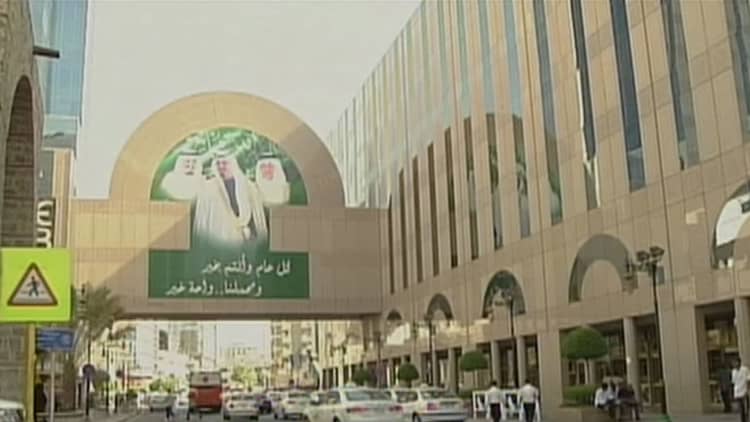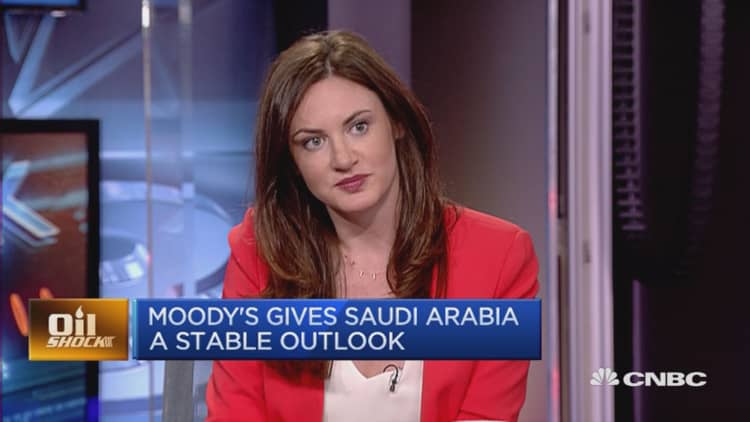
Saudi Arabia has summoned bankers to meetings in Riyadh next week as the oil exporter seeks to launch its debut international bond of about $15 billion as early as July.
Bankers briefed on the plans said that the ministry of finance and a newly-formed debt management office would be hosting a "beauty parade" of lenders on June 6-7 to hear proposals on how to organize the cash-strapped government's first dollar-denominated bond.
Banks expected to take part include the Bank of Tokyo-Mitsubishi, HSBC and JPMorgan Chase, which were lead lenders on the kingdom's $10 billion loan in April. Others thought likely to take part in the talks include BNP Paribas, Citigroup, Deutsche Bank, Goldman Sachs and Morgan Stanley.
Riyadh could shortlist lead and second-tier arrangers as early as mid-June, one of the bankers said. The planned issuance, which could come as early as July, will include several tenors up to 30 years in maturity and would probably be followed by a further bond later this year and potentially another one next year, he said.

Growth in the kingdom has slowed to about 1 per cent of gross domestic product as the government has been forced to slash spending and deplete fiscal reserves to deal with the yawning budget deficit.
The unprecedented step of borrowing on international capital markets, as well as reflecting a stark fiscal crisis, is also part of a broader economic plan to diversify the economy by boosting the private sector and raising non-oil revenue. Although oil prices have recently risen to $50 per barrel from a low of about $27 in January, they are half the level they were in September 2014.
More from the Financial Times :
Doubts raised on claims of strong global demand for Russia's bonds
Russia's bond comeback lands at regulators' door
China issues its first renminbi sovereign debt in London
The government has already been carrying out due diligence and preparing documentation so that it can push ahead with the issuance after the holy fasting month of Ramadan, when regional business activity tails off.
"Now is the right timing for international banks to come back and take business back off the local banks," said one of the bankers, referring to a liquidity shortage that has beset regional banks since the oil price crash.
Gulf governments are rushing to issue bonds ahead of Saudi Arabia's large issuance, which could dominate the market.
Gas-rich Qatar surprised markets last week by issuing $9 billion in international bonds with maturities of five, 10, and 30 years, the largest issuance ever from the Middle East.
Qatar's sale drew investor orders of more than $20 billion, raising expectations that a sale of dollar-denominated debt by Saudi Arabia might be similarly well received by international investors. The sale means that governments, banks and companies in the six-nation Gulf Cooperation Council raised $12.5 billion from capital markets in May — the largest sum on record.
Oman, which alongside Bahrain has been hardest hit among the Gulf states by the oil price slump, is also close to launching an international bond of $1 billion - $2 billion.
Bankers in talks with the government say the sultanate's roadshow could start as early as next week, taking in London, the US and Asian destinations.
"If investors are prepared to lend these sums then why wouldn't governments take it?" said Mike Trounce, emerging market economist at Standard Chartered. "Qatar was prudent to borrow what it could. Across the region governments have got used to operating their economies when prices for commodities were substantially higher than they are now. So although prices for oil and gas have recovered, they are still not back to the levels they were a year ago."



